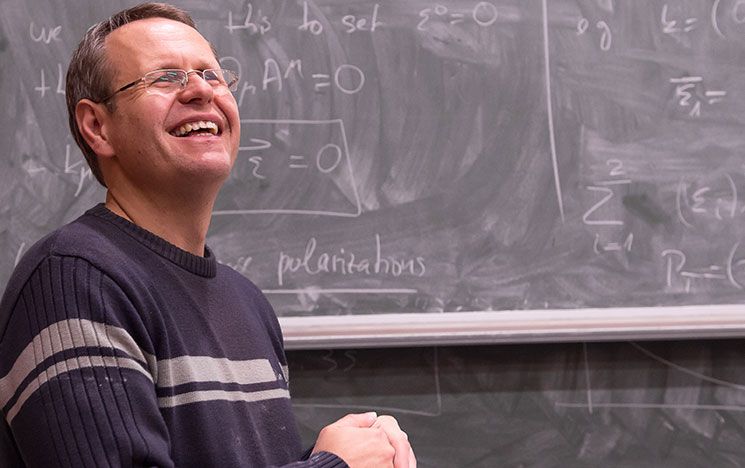Learning as a Physics and Astronomy student
Find out how our individualised teaching, cutting-edge research projects and strong industry links prepare you for a future in physics and beyond.

Teaching and learning
You’ll learn from traditional lectures to workshops, tutorials, seminars and laboratory classes, where you work independently or in groups.
Our friendly and collaborative community and open door policy ensures you have great access to in-person academic support, as well as first-class digital resources for your learning.
You’ll cover all of the fundamental physics, but you can also tailor your course to your interests, with exciting new degrees exploring the frontiers of physics and technology, including Physics with Quantum Technology and Physics with Data Science.
Whichever course you choose, you’ll work on projects which give you the chance to do real cutting-edge research with experts in the field.
During your final year, you’ll complete an individual research project, organising and managing your own investigation, supported by a research active supervisor in an area of your choice.
See the work of undergraduate students in the School of Mathematical and Physical Sciences.
My favourite thing about the course was being able to do a placement year and spend some of my time at CERN.”Giulia Locati
Astrophysics (with an industrial placement year) MPhys
Skills
You’ll develop skills in:
- problem modelling and solving
- mathematics
- computing
- data science
- experimentation.
You’ll also develop more general skills including teamwork, presentation and project management skills, and you’ll practise these with internships and placements opportunities.
Placements and employability
Our dedicated careers and employability officer will help you make decisions about where you want to take your knowledge, and has links with local employers: giving you support in securing placements and internships.
We’re a part of the SEPnet (South East Physics Network) consortium, giving you access to internships and placements across the region.
Add an industrial placement to any of our courses, and undertake a year working in a business that interests you. We will support you on your journey to find and secure your chosen placement.
Find out more about placements and internships at Sussex.
The University also has award winning placement support through their Sussex Career Lab
More support
Improve your academic knowledge and university life skills on our MPS mentoring scheme. This provides students with support on a range of academic issues.
Contact
School of Mathematical and Physical Sciences
School office, Room 3A20, Pevensey II
University of Sussex
Falmer, Brighton
BN1 9QH
+44 (0)1273 678557